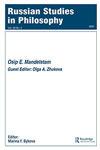The Concept of Culture. Culture as a Communication of Cultures. The World for the First Time
IF 0.1
4区 哲学
Q4 Arts and Humanities
引用次数: 0
Abstract
ABSTRACT In this section, Bibler once again explicates the meaning of the term “culture.” He first defines it as a form of simultaneous being and communication among people of different cultures and eras. The second definition he gives is that culture is a form of self-determination in the horizon of personhood, the self-determination of life, knowledge, and thought. The third is that culture is the world “for the first time.” Culture allows us, author and reader, viewer, and audience, an ability as if to recreate the world of objects—on the surface of a picture or the pages of a literary work—and this world is, at the same time, perceived in its absolute objectivity, in its independence from me. A work of culture is not destroyed or consumed but retains its significance for centuries. The world and objects begin to be understood as if they were works of art. Bibler also considers the style of communicating among people at each of the thresholds of culture. He emphasizes that the author always addresses his work. In this section, he also gives a brief description of the modes of thought of antiquity, the Middle Ages, and the modern era. He characterizes communication among cultures as one of the facets of the idea of a dialogue of logics.文化的概念。作为文化交流的文化。世界第一次
在本节中,Bibler再次解释了“文化”一词的含义。他首先将它定义为不同文化和时代的人们同时存在和交流的一种形式。他给出的第二个定义是,文化是一种在人格范围内的自我决定形式,是生命、知识和思想的自我决定。第三,文化是“第一次”的世界。文化让我们,作者和读者,观众和听众,仿佛有能力在一幅画的表面或文学作品的书页上,重新创造一个物体的世界,同时,这个世界是绝对客观的,独立于我的。一件文化作品不会被摧毁或消耗,而是在几个世纪内保持其意义。世界和物体开始被理解为仿佛它们是艺术品。Bibler还考虑了在每个文化阈值下人们之间的交流风格。他强调作者总是关注他的作品。在这一节中,他还简要描述了古代、中世纪和现代的思维模式。他将文化间的交流描述为逻辑对话理念的一个方面。
本文章由计算机程序翻译,如有差异,请以英文原文为准。
求助全文
约1分钟内获得全文
求助全文
来源期刊

RUSSIAN STUDIES IN PHILOSOPHY
PHILOSOPHY-
CiteScore
0.10
自引率
0.00%
发文量
14
期刊介绍:
Russian Studies in Philosophy publishes thematic issues featuring selected scholarly papers from conferences and joint research projects as well as from the leading Russian-language journals in philosophy. Thematic coverage ranges over significant theoretical topics as well as topics in the history of philosophy, both European and Russian, including issues focused on institutions, schools, and figures such as Bakhtin, Fedorov, Leontev, Losev, Rozanov, Solovev, and Zinovev.
 求助内容:
求助内容: 应助结果提醒方式:
应助结果提醒方式:


